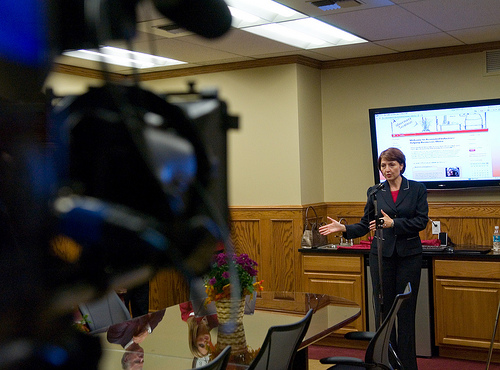


Rep. Cathy McMorris Rodgers (R-WA) spoke at length on the impact of GOP policies on people with disabilities at the National Forum on Disability Issues, held September 28 in Columbus, Ohio. The congresswoman is one of the leading voices for individuals with disabilities in the U.S. House of Representatives.
After spending yesterday looking at the opening remarks made by Rep. Cathy McMorris Rodgers (R-WA) at the September 28 National Forum on Disability Issues (NDFI), today we’ll review the Q&A portion to see what light is shed on the GOP presidential platform and its impact on people with disabilities.
NDFI moderator Frank Sesno began his query of the congresswoman with healthcare-related topics, starting with the Republican plan to restructure Medicaid into block grants that would give each state greater autonomy over how benefits are distributed. McMorris Rodgers supported Governor Romney’s assertion that this approach would be more effective in providing care while reducing costs, but acknowledged that she personally would explore implementing “safeguards” on the federal level that protected the benefits of people with disabilities; she even goes so far as to suggest that pulling “the disability portion out of Medicaid” may be the best way to ensure there is adequate funding to meet the long-term needs of these individuals.
On Romney’s pledge to overturn the Affordable Care Act, McMorris Rodgers said Congress would “take action quickly” to put a different healthcare system in place, which would still have provisions to protect individuals with pre-existing conditions, including people with disabilities.
Almost the entire healthcare discussion is captured in the below YouTube video. Unfortunately, a tape change cuts off just before the lone instance where Sesno really challenges McMorris Rodgers on the subject of long-term care. It’s found on pages 52 and 53 of the downloadable transcript but is worth excerpting here:
[McMorris Rodgers] … [W]e need to look at some incentives so that more people would actually save and buy the long-term care insurance…
[Sesno] There is a real problem with that, if I may. There’s a real problem. About 50 million Americans, Medicare covers about 50 million Americans. Just under nine million of them are people with disabilities. Something like two-thirds of Medicare beneficiaries have income under $30,000 a year. How are they going to afford long-term care insurance?
[McMorris Rodgers] Well, I’m not saying it’s for everyone […] but I do think that there’s a number of people in America that […] if we put in some incentives so that they would actually invest in long-term care insurance, that they would go ahead and do that… I’m not saying every — guy earning $30,000, that’s a high order.
[Sesno] What steps in for that person? […] I think the question that’s raised, when the Governor talks about block granting […] [W]hen you talk about getting the government out of this business, is who then does that? Who then provides that back stop?
[McMorris Rodgers] … [T]here still needs to be a Medicaid program. There still needs to be that safety net available, but […] rather than people going into their senior years thinking that’s going to be the way they pay for long-term care […] [I]f they had an affordable option to actually save and prepare for that through private health insurance, they would do so.
The next part of the Q&A addressed employment for individuals with disabilities, and the tape change meant that there is no video of what might have been McMorris Rodgers most interesting comment on the subject. In conjunction with Senator Tom Harkin (D-IA), she said she has been looking into what the employment barriers are for people with disabilities and thinks there may be an opportunity to help workplaces become more accessible and accommodating with federal monies:
What we find so often is for a lot of employers, it is still new. And I think the Department of Defense has an accommodation fund, for example, and I think those kind of approaches, where we could expand accommodation funds within the federal government, and even look at support for employers who go ahead and hire someone with disabilities to help with maybe some of the costs, whether it is technology or other…assistance that individual may need to get started… I believe that it would, you know, incentivize some employers to take a closer look at that.
McMorris Rodgers also speaks in favor of post-secondary education for people with disabilities, calling these higher education and career training opportunities “the next frontier” in making life matter more for these individuals. She doesn’t specifically reference the $11 million in Transition and Postsecondary Program for Students with Intellectual Disabilities (TPSID) grants currently being used by 27 colleges and universities to develop an educational approach for these students, but did applaud colleges for “making the commitment to opening the door for those with disabilities” and said “we need to encourage more of these types of efforts.” All of which is capture in part 2 of the Youtube video.
We’ll look at the remarks made by President Obama’s delegate, Ted Kennedy Jr., on Monday. Share in the Comments section how you feel about the GOPs approach to issues facing people with disabilities.
Image by Eastern Washington University.
Thanks for this in-depth look at different candidates’ approaches to people with disabilities. The excerpt of McMorris-Rodgers saying, re: unemployed/low income people with disabilities saving for private health insurance, “Well, I’m not saying it’s for everyone” says a lot. What happens to those people? That concerns me if she is one of the biggest voices for differently-abled workers.